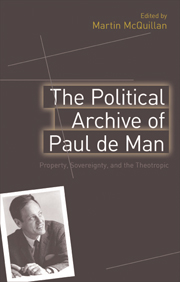Book contents
- Frontmatter
- Contents
- List of Abbreviations
- Acknowledgements
- Notes on Contributors
- Introduction: Broken Promises: Rousseau, de Man and Watergate
- 1 Lovence in Rousseau's Julie ou la Nouvelle Héloïse
- 2 Reading Spectacles in Rousseau's Letter to d'Alembert
- 3 The Utter Misery of the Human Mind: Apotropaic and Theotropic in de Man's Rousseau
- 4 Rhetoric and Rausch: de Man on Nietzsche on Value and Style
- 5 Theotropic Logology: J. Hillis Miller, Paul de Man and Kenneth Burke
- 6 Normativity, Materiality and Inequality: The Politics of the Letter in Paul de Man
- 7 Inscribing the Political: Paul de Man and the Wild Art of Letter Writing
- 8 Mistake in Paul de Man: Violent Reading and Theotropic Violence
- 9 Lightstruck: ‘Hegel on the Sublime’
- 10 De Man vs. ‘Deconstruction’: or, Who, Today, Speaks for the Anthropocene?
- 11 Paul de Man at Work: What Good is an Archive?
- 12 DNA: de Man's Nucleic Archive
- 13 Sovereign Debt Crisis: Paul de Man and the Privatization of Thought
- Appendix: Nietzsche I: Rhetoric + Metaphysics
- Index
3 - The Utter Misery of the Human Mind: Apotropaic and Theotropic in de Man's Rousseau
Published online by Cambridge University Press: 05 August 2013
- Frontmatter
- Contents
- List of Abbreviations
- Acknowledgements
- Notes on Contributors
- Introduction: Broken Promises: Rousseau, de Man and Watergate
- 1 Lovence in Rousseau's Julie ou la Nouvelle Héloïse
- 2 Reading Spectacles in Rousseau's Letter to d'Alembert
- 3 The Utter Misery of the Human Mind: Apotropaic and Theotropic in de Man's Rousseau
- 4 Rhetoric and Rausch: de Man on Nietzsche on Value and Style
- 5 Theotropic Logology: J. Hillis Miller, Paul de Man and Kenneth Burke
- 6 Normativity, Materiality and Inequality: The Politics of the Letter in Paul de Man
- 7 Inscribing the Political: Paul de Man and the Wild Art of Letter Writing
- 8 Mistake in Paul de Man: Violent Reading and Theotropic Violence
- 9 Lightstruck: ‘Hegel on the Sublime’
- 10 De Man vs. ‘Deconstruction’: or, Who, Today, Speaks for the Anthropocene?
- 11 Paul de Man at Work: What Good is an Archive?
- 12 DNA: de Man's Nucleic Archive
- 13 Sovereign Debt Crisis: Paul de Man and the Privatization of Thought
- Appendix: Nietzsche I: Rhetoric + Metaphysics
- Index
Summary
The more that some statements get quoted, rolled out as flat theses or synoptic specimens, the more the quotation begins to work like a charm. Does not the following sentence tell us all we need to know about Paul de Man's scepticism, his nihilism? Shall we not corral him right here?
The Triumph of Life warns us that nothing, whether deed, word, thought, or text, ever happens in relation, positive or negative, to anything that precedes, follows, or exists elsewhere, but only as a random event whose power, like the power of death, is due to the randomness of its occurrence.
(RR 122)Framing the sentence, whether by quoting it or writing it up to start with, may not actually fix (or erase) all its thoughts, one by one and once and for all. Simon Jarvis has heard in the extremity of this passage, and noticed hearing, something different: a wish or fear. He reads the de Man sentence, I think, precisely in order to accommodate its speculative and ex cathedra cast, rather than to defuse or reject it. For him, the exhaustively legalistic disclaimer may not be a pure giveaway but also the shielding of something. De Man gets an entire ‘cognitive mood’ onto the page – rather than ‘re-framing’ it, as the popular psychologists urge – and without betraying the thought or experience sustained in that mood by pre-adapting it to the restrictive canons of certainty – or even those of evidence, consistency, and modesty. Such adaptation is cognitive excision.
- Type
- Chapter
- Information
- The Political Archive of Paul de ManProperty, Sovereignty and the Theotropic, pp. 41 - 56Publisher: Edinburgh University PressPrint publication year: 2012

